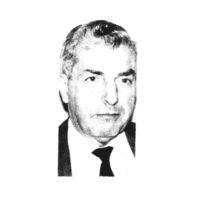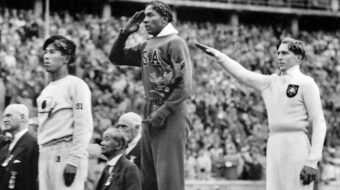
Editor’s Note:
This article is adapted from a 1971 book by Dr. Hyman Lumer titled, Zionism: Its Role in World Politics. Released by International Publishers, the book appeared in the aftermath of the 1967 “Six-Day War.” During that war and in the years that followed, debates around Zionism, Israel, oil, and Middle East conflict were central parts of political life.
Lumer was editor of Jewish Affairs, a Communist Party USA publication. A foe of both anti-Semitism and Zionism, he wrote his book as a primer on the historical context and ideological battles animating the events of his time. Today, in the midst of Israel’s latest war against Palestine, People’s World pulled Lumer’s book from the archives to share excerpts of his analysis with our readers. While the situation has evolved in the half-century since it was written, the book still retains valuable information relevant to understanding the current war.
This article is the second installment in a three-part series. The first part dealt with the nature and roots of Zionism as an ideology. This article examines the founding of the State of Israel and Zionism’s role in guiding its domestic policies and approach to relations with the Palestinian people and neighboring Arab countries. The third part will lay out details of the long-running efforts of Zionist ideologues to align Israel with the interests of the big imperialist powers, primarily Britain in the early days, and eventually, the United States.
ZIONISM AND ISRAEL

How the State of Israel was born
The State of Israel had its origins in the U.N. resolution of Nov. 29, 1947, which partitioned Palestine into two states, one Jewish and one Arab. It was not, as is maintained in some quarters, a creation of Britain.
To be sure, British imperialism encouraged Jewish settlement in Palestine through the Balfour Declaration of 1917. But it did so only to pit Jews and Arabs against one another in order to perpetuate British rule under the League of Nations Mandate. In the later years of the Mandate, the British severely restricted Jewish immigration into Palestine, and at no time did they support the formation of an independent Jewish state.
The British ruling circles, though they had surrendered the Mandate in 1947 on the grounds that internal conflict made it impossible to exercise it, opposed the partition of Palestine. Their U.N. representatives abstained from voting on the partition resolution and on all related questions, and they announced that Britain would do nothing to implement the resolution if either the Jews or the Arabs objected to it.
What they hoped was that because of Jewish-Arab antagonisms, partition would fail and that in the ensuing chaos the U.N. would find no alternative other than continuation of British rule in one form or another.
Furthermore, it was to a certain degree British imperialism which instigated the Arab states to attack the newborn State of Israel in 1948. Many of these Arab states were at that time governed by rulers subservient to Britain.
“The objective of this military action by British imperialism,” writes Bert Ramelson, a researcher with the Communist Party in Britain, “was to frustrate the implementing of the U.N. resolution, to hang on to the whole of Palestine, and by parcelling it out among Arab…rulers, to retain indirectly what Britain previously held directly as the mandatory power.” (The Middle East, pp. 13-14.)
Nor did the Truman administration in this country display any great enthusiasm for partition. On the contrary, motivated largely by pressures emanating from the oil interests, it maneuvered to modify or to circumvent the partition proposals.
The main initiative leading to the U.N. action came from the Soviet Union, supported by the other socialist countries. In a speech on May 14, 1947, Soviet U.N. representative Andrei Gromyko called for “the creation of a single Arab-Jewish state with equal rights for Jews and Arabs…as the solution most deserving attention, of this complicated problem.” But should this prove unrealizable because of sharpened Jewish-Arab hostility, “then it would be necessary to consider an alternative solution which…consists of the division of Israel into two states—one, Jewish, and one, Arab.”
Among the reasons given by Gromyko for his proposals was the need to find a haven for the many Jewish refugees who had been left stranded (thanks mainly to the refusal of the capitalist states to admit them) at the end of World War II. But he also presented a more cogent reason, namely, that there already existed a significant Jewish community in Palestine. He said:

“We must bear in mind the incontestable fact that the population of Palestine consists of two peoples, Arabs and Jews. Each of these has its historical roots in Palestine. That country has become the native land of both these peoples, and both of them occupy an important place in the country economically and culturally. Neither history nor the conditions which have arisen in Palestine now can justify any unilateral solution of the Palestine problem, either in favor of the creation of an independent Arab state, ignoring the lawful rights of the Jewish people, or in favor of the creation of a Jewish state, ignoring the lawful rights of the Arab population…. A just settlement can be found only if account is taken in sufficient degree of the lawful interests of both peoples.”
In 1946, there were in Palestine some 608,000 Jews, nearly one-third of the total population of 1,973,000. These constituted a substantial and distinct Jewish community. To be sure, they were in the main recent immigrants who had come during the war. The bulk of them came, however, not as Zionist usurpers of Arab land but rather, in the face of enormous difficulties, as refugees from the horrors of Nazism, most of whom had literally nowhere else to go.
The Soviet Union was strongly opposed to the Zionist concept of a Jewish state, but that was not the issue here. Under the circumstances that prevailed in 1947, it would have been just as wrong to agree to complete Arab domination as to accede to the Zionist demand to make all of Palestine a Jewish homeland. The course proposed by the Soviet Union was therefore the only realistic and just one available at the time.
Had the Jews and Arabs formed a common front against British imperialism at the end of World War II, the outcome of their victory in such a struggle might have been some form of binational state. In fact, it was such a possibility that the Soviet proposals envisaged. But this was not to be, and there remained in the end only the alternative of partition.
The basis for the coming into being of the State of Israel was not created by Zionism. Until the advent of Hitlerism with its monstrous crimes against the Jews, comparatively few Jews were induced by the Zionists to migrate to Palestine (in 1931, the Jewish population was about 175,000, a little more than one-fourth of the 1946 figure).
It was the wave of immigration of refugees during and immediately after the war that first created a substantial Jewish community, and the new wave of immigration from Eastern Europe after 1948, stemming from the horrors of Hitlerism, that swelled the size of this community, doubling its numbers within a few years.
But it was the Zionists who retained control and who fashioned the state according to their own design. The validity of Israel’s existence as a state derives from the U.N. partition resolution. However, the state envisioned by that resolution is not that conceived of and established by Zionism.
For Jews exclusively
The Jewish state envisioned by Zionism was to be exclusively Jewish, for only in such a state, according to Zionist doctrine, would it be possible to escape anti-Semitism. That Palestine was also populated by Arabs was either ignored or regarded as an inconvenience to be removed or at best tolerated.
Herzl spoke of settlement in Palestine in terms of “a people without a land to a land without a people.” For him, the Palestinian Arabs simply did not exist as a people. And this attitude has continued to prevail. It was manifested in pronounced form by Israel’s first Prime Minister, David Ben-Gurion, of whom the Israeli writer Aubrey Hodes says:
“Ben-Gurion had little time for the Arabs… He despised the Arab way of life and warned publicly against the danger that Israel would become another Levantine country ‘like Saudi Arabia or Iraq…’ It is significant that during his 13 years as Prime Minister of Israel, he did not pay a single official visit to the city of Nazareth, the largest Arab center in Israel.” (Dialogue With Ishmael, p. 67.)
Michael Bar-Zohar, Ben-Gurion’s biographer, gives the following picture of the latter’s views at the time of the 1948 war: “Ben-Gurion remained skeptical about any possibility of coexistence with the Arabs. The fewer there were living within the frontiers of the new Jewish state, the better he would like it….” (Ben-Gurion, p. 103.)
Israeli Arabs: Second-class citizens

In accord with the Zionist concept, Israel has been established as a state in which any Jew anywhere in the world may immigrate and claim citizenship and enjoy special ethnic and religious privileges.
On the other hand, Arabs whose ancestors have lived there for countless generations are merely tolerated as aliens, reduced to second-class citizenship, and treated as a “fifth column” whose sympathies lie with Israel’s enemies.
During the 1948 war, some 750,000 Arabs either fled in panic or were driven from their homes to become refugees living in wretched settlements of tents and shacks in the surrounding Arab countries, mainly in Jordan. As a result, cities and towns once wholly populated by Arabs are now either entirely Jewish or have small Arab minorities.
The Israeli rulers seized more than half the territory allotted to the Palestinian Arab state in the U.N. partition resolution of 1947, and they proceeded to take over the property abandoned by the Arabs who had fled.
And despite a repeatedly reaffirmed UN resolution calling for either repatriation or compensation of the refugees, the Israeli authorities have rejected all responsibility for the refugees. Behind this policy lies the idea that the fewer Arabs remaining in Israel the better.
Sephardic Jews: An oppressed majority
Discrimination in Israel is not confined to Arabs. It is visited also on the darker-skinned Sephardic Jews, coming mainly from Arab countries such as Yemen, Iraq, and the North African states.
Much poorer and less educated than Jews of Western origin [Ashkenazi, largely eastern European initially], these have been thrust down to the lowest rungs of the economic and social ladders. They are crowded into the most unskilled, lowest-paying jobs. In addition, they are packed into “old city” slum ghettos, with a housing density three to five times that of other groups. They lag far behind in education. They are victims of discrimination and prejudice and are subjected to all sorts of insults and indignities.
At times, the culture of the Sephardic Jews has been at times rejected as not being “Jewish,” and the dominant group of Western origin, though now decidedly in the minority, nevertheless seeks to impose its culture on a majority whose cultural traditions are quite different.
Underlying this is the Zionist conception of Israel as a “Western” society which is Middle Eastern only geographically. The Zionists’ greatest fear is that Israel will become “Levantinized.” And what greater source of such a danger is there than the already “Levantinized” Sephardic Jews who are a majority of the population, not to speak of the added percent of the population which is Arab?
Accordingly, every effort is made to downgrade and smother their culture—to “Westernize” them, to teach their children “Western” ways in the schools and to relegate them to a subordinate place in Israeli society. And every effort is made to promote immigration of Western [European and U.S.] Jews in order to offset the majority status of the Sephardic Jews.
[Editor’s Note: The dynamics of the Ashkenazi / Sephardic conflict have altered somewhat since this article was written due to demographic evolution but the conflict remains.]

A theocratic state
Finally, the Jewish state of the Zionists is a theocratic state. A basic change in policy and direction for Israel, therefore, requires the abandonment of these precepts and the conclusions flowing from them.
If the movement against the present policy of aggression is to grow and to acquire effective organized form, it is essential to lay bare the reactionary bourgeois-nationalist character of Zionism and its domination by big Jewish capital in league with U.S. monopoly capital as a whole.
A fight must be waged against the idea of Israel as the state of all the Jewish people and of Jews exclusively, and for an Israel conceived of as the land of the Israeli people—a land of full equality of all Israeli citizens, whether Jew or Arab, Ashkenazi or Sephardic. It is necessary to fight for an Israel which will become part of the Middle East and will seek its ties not with the forces of imperialism which oppress the Arab peoples but with the anti-imperialist forces among the Arabs.
It is necessary to strive for Israeli independence of foreign monopoly capital…and for the achievement of economic independence as the only foundation for a viable economy and a secure future. It is necessary to press for recognition of the right of self-determination of the Palestinian Arabs, including a just solution of the refugee question. It is necessary, in a word, to fight for the de-Zionization of Israel. The unfolding of such struggles is the task of the Israeli people in the first place—but not of the Israeli people alone.
In the United States—the heartland of world imperialism and the home of the world’s largest Jewish community—the fight against Zionism takes on exceptional importance. It is here, above all, that the dangerous machinations of U.S. imperialism in the Middle East must be combatted. It is here, next to Israel itself, that the pressures to compel a basic change in Israeli foreign policy must be generated.
The eradication of Zionist influences will mark a big step forward for the Jewish people. It will permit them, in Israel and in other countries, to turn their creative energies in more fruitful directions. It will go far toward freeing them of racist and chauvinist influences. It will open up the way toward Jewish-Arab brotherhood and peace in the Middle East. And it will contribute greatly to securing world peace.
Next:
We hope you appreciated this article. At People’s World, we believe news and information should be free and accessible to all, but we need your help. Our journalism is free of corporate influence and paywalls because we are totally reader-supported. Only you, our readers and supporters, make this possible. If you enjoy reading People’s World and the stories we bring you, please support our work by donating or becoming a monthly sustainer today. Thank you!












Comments